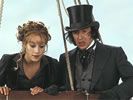Eye For Film >> Movies >> Around The World In 80 Days (2004) Film Review
What is it about the Chan man? He made fabulous fun of the Western in Shanghai Noon and yet fell flat on his face in Shanghai Knights, its sequel, set in Sherlock Holmes's London.
Around The World In 80 Days won the Oscar for Best Picture in 1956 for producer Mike Todd, one of Elizabeth Taylor's more flamboyant husbands, and catapulted David Niven into the higher echelons of A-list stars. History won't repeat itself this time and Steve Coogan is unlikely to surpass Hugh Grant in the American mind as the quintessential English toff, not because his Phileas Fogg, is, in Molesworth mi's words "a weed", but because he's funny in the obsessive manner of a gentleman scientist who doesn't get out much.

Jules Verne can rest peacefully in his grave. Jackie Chan takes liberties with his story, but all in the cause of entertainment. He plays Lau Xing, a Chinaman who robs the Bank of England of a jade Buddha and gives the bumbling London peelers the slip by accepting the post of eccentric inventor Fogg's valet. The Buddha had been stolen from his village by a gang of masked bandits, calling themselves The Black Scorpions, led by the beautiful, deadly General Fang (Karen Mok), whose motives are not entirely decipherable.
The 80 days' excursion is the result of a crazy wager between Fogg and Lord Kelvin (Jim Broadbent), the reactionary president of the Royal Academy of Science. Xing, now calling himself Passepartout, accompanies the hapless Fogg on his journey, picking up a scatterbrained French hatcheck girl, Monique La Roche (Cecile De France), with artistic pretensions, in Paris, and followed at an unsafe distance by the accident-prone Inspector Fix (Ewen Bremner) from the Metropolitan Police.
The film evolves into a series of set pieces, introducing a rash of famous names in cameo roles, including Sir Richard Branson as a balloonist (what else?) and Kathy Bates as Queen Vic. Why it works so well, where Shanghai Knights did not, is to do with style. The combination of pastiche, martial arts, slapstick, special effects, sentimentality and well judged performances feels light enough to blow away and yet never witless. The sole exception is Bremner, who appears to have staggered out of a Charlie Chaplin silent short with pieces of his brain missing.
Broadbent demonstrates the magnificence of Victorian arrogance and Coogan steps well back from the false sincerity of Alan Partridge to give Phileas the respect he deserves. Chan's comic timing and fighting skills are sharper than ever - will this man ever grow old? This is what he has been hoping to achieve in Hollywood ever since he arrived from Hong Kong, a thoroughly entertaining adventure yarn, with believable characters who provide a quality of skills not immediately associated with school holiday fare.
Phileas knows that his wager is foolish and yet accepts it anyway. Such idiocy requires a special kind of courage. It's called naivety. Long may it thrive.
Reviewed on: 09 Jul 2004



















